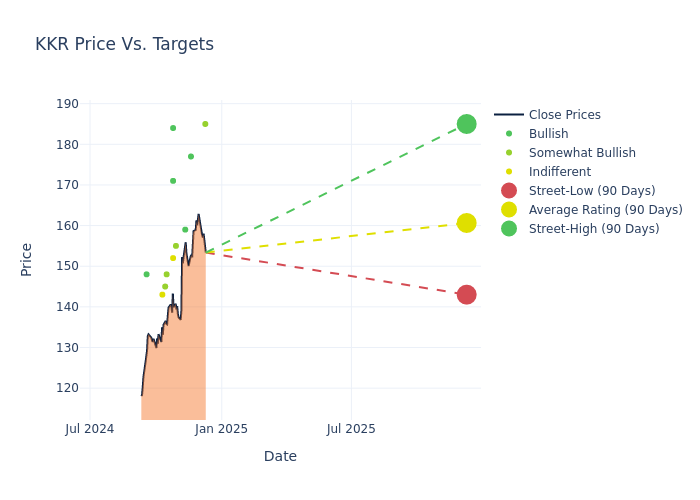
18 analysts have shared their evaluations of KKR (NYSE:KKR) during the recent three months, expressing a mix of bullish and bearish perspectives.
The following table encapsulates their recent ratings, offering a glimpse into the evolving sentiments over the past 30 days and comparing them to the preceding months.
| Bullish | Somewhat Bullish | Indifferent | Somewhat Bearish | Bearish | |
|---|---|---|---|---|---|
| Total Ratings | 7 | 7 | 4 | 0 | 0 |
| Last 30D | 0 | 1 | 0 | 0 | 0 |
| 1M Ago | 2 | 0 | 0 | 0 | 0 |
| 2M Ago | 3 | 4 | 2 | 0 | 0 |
| 3M Ago | 2 | 2 | 2 | 0 | 0 |
Analysts have recently evaluated KKR and provided 12-month price targets. The average target is $155.89, accompanied by a high estimate of $185.00 and a low estimate of $130.00. This current average has increased by 8.07% from the previous average price target of $144.25.

Interpreting Analyst Ratings: A Closer Look
A comprehensive examination of how financial experts perceive KKR is derived from recent analyst actions. The following is a detailed summary of key analysts, their recent evaluations, and adjustments to ratings and price targets.
| Analyst | Analyst Firm | Action Taken | Rating | Current Price Target | Prior Price Target |
|---|---|---|---|---|---|
| Benjamin Budish | Barclays | Raises | Overweight | $185.00 | $166.00 |
| Alexander Blostein | Goldman Sachs | Raises | Buy | $177.00 | $160.00 |
| Brian Bedell | Deutsche Bank | Raises | Buy | $159.00 | $158.00 |
| Devin Ryan | JMP Securities | Raises | Market Outperform | $155.00 | $150.00 |
| Bill Katz | TD Cowen | Raises | Buy | $184.00 | $166.00 |
| Chris Allen | Citigroup | Raises | Buy | $171.00 | $157.00 |
| Benjamin Budish | Barclays | Raises | Overweight | $166.00 | $149.00 |
| Alexander Blostein | Goldman Sachs | Raises | Buy | $160.00 | $145.00 |
| Michael Brown | Wells Fargo | Raises | Equal-Weight | $152.00 | $139.00 |
| Chris Kotowski | Oppenheimer | Raises | Outperform | $148.00 | $128.00 |
| Glenn Schorr | Evercore ISI Group | Raises | Outperform | $145.00 | $135.00 |
| Michael Cyprys | Morgan Stanley | Raises | Equal-Weight | $143.00 | $107.00 |
| Michael Brown | Wells Fargo | Raises | Equal-Weight | $139.00 | $130.00 |
| Devin Ryan | JMP Securities | Raises | Market Outperform | $150.00 | $135.00 |
| Benjamin Budish | Barclays | Raises | Overweight | $149.00 | $146.00 |
| Alexander Blostein | Goldman Sachs | Raises | Buy | $145.00 | $137.00 |
| Vikram Gandhi | HSBC | Announces | Buy | $148.00 | - |
| Michael Brown | Wells Fargo | Announces | Equal-Weight | $130.00 | - |
Key Insights:
- Action Taken: Analysts frequently update their recommendations based on evolving market conditions and company performance. Whether they 'Maintain', 'Raise' or 'Lower' their stance, it reflects their reaction to recent developments related to KKR. This information provides a snapshot of how analysts perceive the current state of the company.
- Rating: Gaining insights, analysts provide qualitative assessments, ranging from 'Outperform' to 'Underperform'. These ratings reflect expectations for the relative performance of KKR compared to the broader market.
- Price Targets: Analysts set price targets as an estimate of a stock's future value. Comparing the current and prior price targets provides insight into how analysts' expectations have changed over time. This information can be valuable for investors seeking to understand consensus views on the stock's potential future performance.
Capture valuable insights into KKR's market standing by understanding these analyst evaluations alongside pertinent financial indicators. Stay informed and make strategic decisions with our Ratings Table.
Stay up to date on KKR analyst ratings.
All You Need to Know About KKR
KKR is one of the world's largest alternative asset managers, with $624.4 billion in total managed assets, including $505.7 billion in fee-earning AUM, at the end of September 2024. The company has two core segments: asset management (which includes private markets—private equity, credit, infrastructure, energy, and real estate—and public markets—primarily credit and hedge/investment fund platforms) and insurance (following the firm's initial investment in, and then ultimate purchase of, Global Atlantic Financial Group, which is engaged in retirement/annuity and life insurance lines as well as reinsurance).
Understanding the Numbers: KKR's Finances
Market Capitalization Analysis: Above industry benchmarks, the company's market capitalization emphasizes a noteworthy size, indicative of a strong market presence.
Revenue Growth: KKR's revenue growth over a period of 3 months has been noteworthy. As of 30 September, 2024, the company achieved a revenue growth rate of approximately 44.56%. This indicates a substantial increase in the company's top-line earnings. As compared to its peers, the company achieved a growth rate higher than the average among peers in Financials sector.
Net Margin: KKR's net margin is below industry averages, indicating potential challenges in maintaining strong profitability. With a net margin of 12.69%, the company may face hurdles in effective cost management.
Return on Equity (ROE): KKR's ROE falls below industry averages, indicating challenges in efficiently using equity capital. With an ROE of 2.62%, the company may face hurdles in generating optimal returns for shareholders.
Return on Assets (ROA): The company's ROA is below industry benchmarks, signaling potential difficulties in efficiently utilizing assets. With an ROA of 0.17%, the company may need to address challenges in generating satisfactory returns from its assets.
Debt Management: KKR's debt-to-equity ratio is notably higher than the industry average. With a ratio of 2.1, the company relies more heavily on borrowed funds, indicating a higher level of financial risk.
Analyst Ratings: What Are They?
Benzinga tracks 150 analyst firms and reports on their stock expectations. Analysts typically arrive at their conclusions by predicting how much money a company will make in the future, usually the upcoming five years, and how risky or predictable that company's revenue streams are.
Analysts attend company conference calls and meetings, research company financial statements, and communicate with insiders to publish their ratings on stocks. Analysts typically rate each stock once per quarter or whenever the company has a major update.
Some analysts publish their predictions for metrics such as growth estimates, earnings, and revenue to provide additional guidance with their ratings. When using analyst ratings, it is important to keep in mind that stock and sector analysts are also human and are only offering their opinions to investors.
Breaking: Wall Street's Next Big Mover
Benzinga's #1 analyst just identified a stock poised for explosive growth. This under-the-radar company could surge 200%+ as major market shifts unfold. Click here for urgent details.
This article was generated by Benzinga's automated content engine and reviewed by an editor.







